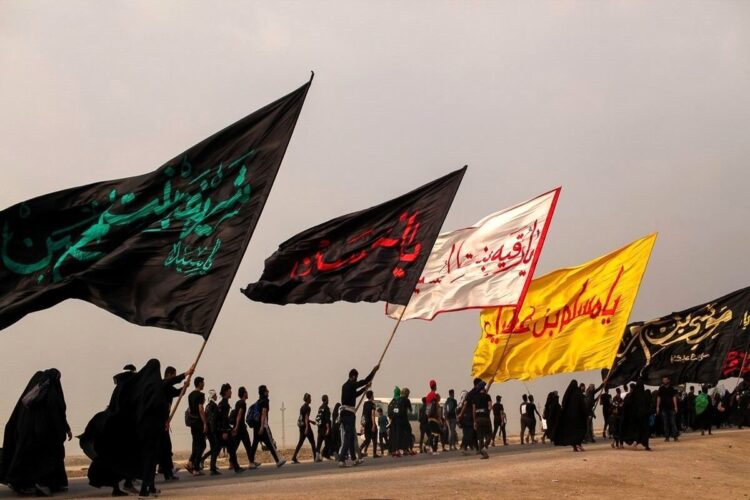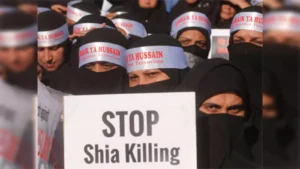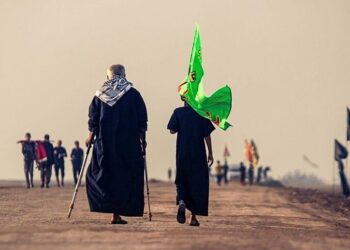Introduction
In the rich cultural tradition of mourning for Hussein, the significance of Arbaeen has been deeply ingrained among Shia communities since ancient times. Specifically, Arbaeen is believed to be the 40th day following the martyrdom of Hussein, which coincides with the 20th day of the month of Safar.
The 20th of Safar marks a poignant occasion, as it was on this day that Hussein’s family, comprising the caravan of captives, returned to Medina from their long and arduous journey from Syria. Furthermore, it is also the day that Jabir bin Abdullah bin Haram Ansari, a respected companion of the Prophet Muhammad (peace be upon him), arrived in Karbala from Medina to pay his respects at the grave of Hussein. Notably, Jabir bin Abdullah was the first person to visit the grave of the revered Imam Hussein, an act that has been immortalized in Shia tradition.
Bloody Arbaeen in Pakistan
Bloody Arbaeen Lahore and Karachi
On January 25, 2011, two devastating attacks on Shia mourners in Lahore and Karachi left a trail of blood and destruction. In Lahore, a bomb exploded in a procession of Arbaeen mourners in the Gohari Chowk area, killing 13 people and injuring 52 others. The bomber, a teenage boy hired by Takfiri extremists, had concealed the explosive device in a handbag among the mourners. The Pakistani Taliban claimed responsibility for the attack, which targeted Shia Muslims in the city.
In a separate incident, a suicide bomber in Karachi’s Malir area attempted to detonate his bomb among mourners, but was stopped by police and detonated the bomb prematurely near the scene. The blast killed three policemen and wounded 10 others, sparing the lives of the mourners who were farther away. In response to the attacks, Pakistani Shia leaders announced three days of mourning for the killing of Hussaini.
Tragically, another attack on Husseini mourners in Karachi resulted in the deaths of at least 25 people and injuries to many more.
Attack on Arbaeen Pilgrims in Quetta
As the eve of Arbaeen approached, a devastating suicide attack on a bus carrying Pakistani Shia pilgrims left a trail of death and destruction. The bus, which was traveling from Quetta to Taftan, was planning to continue on to Mashhad and eventually Karbala. The attack occurred in the Mastung area, approximately 30 kilometers from Quetta city, where the pilgrims were en route to their destination.
According to reports, a motorcyclist carrying large amounts of explosives crashed into one of the buses, causing it to explode and resulting in the complete destruction of the vehicle. The passengers inside the bus, who were primarily from Parachenar, Lahore, Rawalpindi, and Bhutan, were trapped and burned alive.
Official sources confirmed that 19 people had lost their lives in the attack, but some unofficial reports suggested that nearly all 45 passengers on the bus were killed, with only a few survivors. The second bus was slightly damaged, while the third bus was left untouched.
A high-ranking government official in Quetta revealed that there were approximately 180 Shia pilgrims in the group, and one of the buses was severely damaged by the explosion. The incident highlights the vulnerability of Shia minorities in Baluchistan province, which has been plagued by deadly attacks against Shiites.
The Pakistani Taliban claimed responsibility for the attack, but security authorities suspect that “Jhangvi Army”, a notorious anti-Shia terrorist group, was behind the massacre. The incident comes on the heels of another horrific attack, in which 21 Pakistani policemen were kidnapped and killed by the Taliban just a day prior.
The Bloody Arbaeen of Zanzibar, 1964
The Arbaeen ceremony in Zanzibar is a unique and symbolic event that is considered one of the oldest and most famous in the world. The ceremony, which is held every year for three days in Zanzibar, was first introduced by Iranian migrants who brought their Shia culture and traditions to the East African region. The event has been an important part of Shia culture and identity in the region for centuries.
However, the Bloody Arbaeen of Zanzibar in 1964 was a brutal and devastating event that marked a turning point in the history of the island. Obeid Korome, a Marxist-Leninist leader, came to power in Zanzibar and established a regime of terror, targeting Arabs, Indians, and Iranian Shiites who had lived on the island for centuries. Thousands of people were forced to leave their homes and properties were confiscated under the pretext of promoting public education.
The most heinous crime of the communist regime was the massacre of Shia Khoja during the Arbaeen ceremony in 1964. This event led to a mass exodus of Indian and Iranian Shiites, whose population was over 10,000, from the island to Dar es Salaam and other countries. The old Shia mosque and tomb of Iranian missionaries were destroyed, and many Shia schools and places were confiscated.
The regime’s brutal treatment of ethnic minorities continued until Obeid Korome’s assassination in 1972. However, even after his death, the Shiites were still subjected to pressure and intimidation. Despite this, they continued to hold the Arbaeen ceremony every year, hoping to keep their traditions alive and preserve their cultural identity.
Today, Shiites from around the world travel to Zanzibar to participate in the Arbaeen ceremony, which is considered one of the oldest religious occasions in Africa. Despite its significance, the ceremony has not been registered by UNESCO as a spiritual heritage due to the lack of recognition from the secular government of Zanzibar.

















